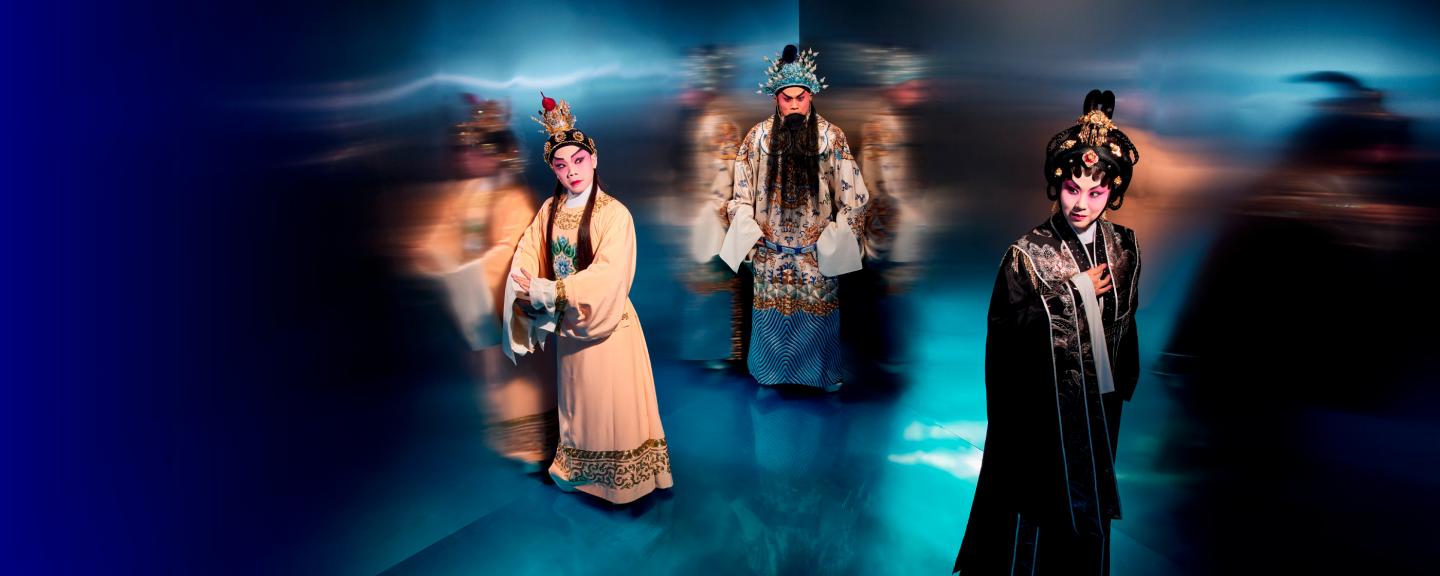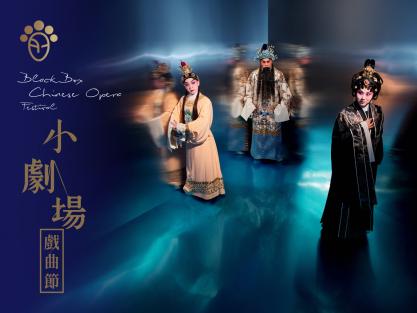Main
Description
戲曲中心小劇場粵劇系列第三部原創作品,《霸王別姬》(新編)及《文廣探谷》的監製兼導演鍾珍珍領軍,黎耀威和黃寶萱再度聯合編劇、導演、編曲,與藝術新秀獎得主吳立熙,及青年演員沈栢銓共同演出。
劇中演員將傳統身段唱腔與現代音樂結合,並運用錄像設計及現代劇場的舞台裝置及各種元素,營造爾虞我詐的氣氛,同時思考宿命論:到底命運是否早被注定?
「奉天承運,皇帝詔曰……」於太廟領旨的武成王、文貴妃和敦華太子尚在忖測聖意之際,傳旨太監突倒下,聖旨上卻只有「王位」,這二字不單戳破三人的野心,更牽扯出皇族之間的權謀和心計。宮廷之內,是否需要不擇手段,方可「奉天承運」?
《奉天承運》為戲曲中心首個通達共融的製作,我們經過遴選邀請聾人藝術家黃耀邦參演劇中角色,此外,每場演出均設有劇場視形傳譯。
冠名贊助:
製作:

藝術及製作團隊:
監製、導演:鍾珍珍*
編劇、導演、編曲:黎耀威、黃寶萱
技術總監:胡偉聰*
舞台設計:黃逸君
燈光設計:蕭健邦
音響設計:温新康
錄像設計:方曉丹
助理監製:李嘉隆*
製作經理:盧月芳*、陳嘉儀*
監製助理:莊淑雯*、丘穎晞*
演員:
黎耀威 飾 武成王
黃寶萱 飾 文貴妃
吳立熙 飾 敦華太子
沈栢銓 飾 榮謙
黃耀邦 飾 榮福
樂師:
音樂領導:毛奕俊
擊樂領導:陳定邦
樂師(依筆劃序排名):何卓晉、何卓濤、高永熙、梁淑妍、陳一凡、黃婉苓、黎家維、鍾詩玲、蘇紹勳
*西九文化區職員
Additional info
Tabs
Following Farewell My Concubine (New Adaptation) and Wenguang Explores the Valley, The Imperial Decree is the Xiqu Centre’s third experimental Cantonese opera production.
Unlike its two predecessors, which were inspired by historical events and existing plays, The Imperial Decree features an original story. Through a plot pregnant with intrigue, twists and clashing personalities, it explores the existence of fate and freewill.
The production employs a series of artistic and technological innovations that transform the viewer experience on several levels. It breaks away from the traditional Cantonese opera storytelling format, and combines classical performance techniques with contemporary music and dance. Meanwhile, modern technological installations bring to the stage another dimension of reality where space and time can shift in an instant. Video, lighting and sound effects, along with the set design, come together to vividly illustrate the interiors of the characters, creating a Cantonese opera experience that’s entirely refreshing and unique.
In addition, for the Xiqu Centre’s first inclusive production, we were committed to upholding the spirit of inclusivity throughout the writing and making of the show and providing the space for artists with different abilities to showcase their immense talent. In the end, it gave The Imperial Decree all the more depth and heart. We hope that by working with differently-abled people, we can strengthen the connections between the public, Cantonese opera culture and our communities, and promote diversity and inclusion through the beauty of Cantonese opera.
Cantonese Opera
Originating in the Guangzhou region of southern China, Cantonese opera is a genre of Chinese traditional theatre that is popular in Guangdong, Guangxi, Hong Kong and Macau, as well as the Chinese diaspora in Southeast Asia, America and Europe. The singing style adopts elements of bangzi and erhuang (traditional vocal and phrasing styles), and combines tunes of various origins, including set tunes from gaoqiang (high-pitched) and Kunqu genres and elements of folk narrative singing. Cantonese opera was inscribed onto the UNESCO Representative List of the Intangible Cultural Heritage of Humanity in 2009.


